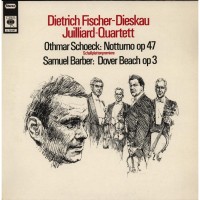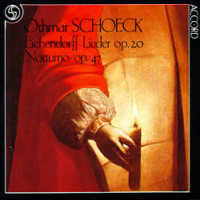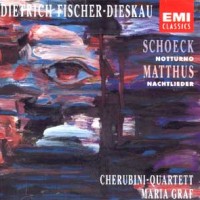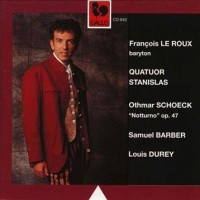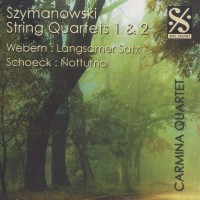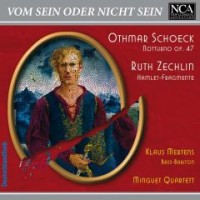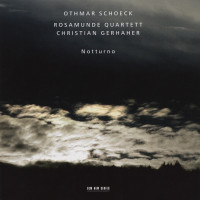Schoeck’s Notturno, a survey
|
Walt Mundkowsky [August 2013.]
Othmar SCHOECK: Notturno, Op. 47 (1931-33). Samuel BARBER: Dover Beach, Op. 3 (1931). (Rec. 1967.) Dietrich Fischer-Dieskau (bar), Juilliard Quartet: Robert Mann, Earl Carlyss (vlns), Raphael Hillyer (vla), Claus Adam (vlc). Columbia KS 7131 (LP). CD transfer by Mark Lyon (http://www.audio-restorations.com/). The first recording remains unchallenged. Fischer-Dieskau knew Schoeck very well and the sessions found him in prime voice, strongly aided by the Juilliard’s incision and lift. Notturno is likely Schoeck’s most modern score; Berg admired it. This Dover Beach (“a darkling plain” indeed) has appeared on several CD reissues.
Othmar SCHOECK: Notturno, Op. 47 (1931-33)1; Eichendorff Lieder, Op. 20 (1905-14)2. (Rec. 19801, 19872.) Niklaus Tüller1,2 (bar), Bern Quartet1: Alexander van Wijnkoop, Eva Zurbrügg (vlns), Henrik Crafoord (vla), Walter Grimmer (vlc); Christoph Keller2 (pno). Accord 149180 (O/P). Tüller, a factor in Jecklin’s complete edition of the songs, leaves me neither shaken nor stirred. One’s focus shifts to the quartet, which provides the impetus and mystery. Tüller seems more at ease in the eight Eichendorff settings from Op. 20 (six on Uhland poems are bypassed). Keller’s piano is reticent. (Lyrics in German only.)
Othmar SCHOECK: Notturno, Op. 47 (1931-33). Siegfried MATTHUS: Nachtlieder (1987)*. (Rec. 1991, Schoeck; 1990, Matthus.) Dietrich Fischer-Dieskau (bar), Cherubini Quartett: Christoph Poppen, Harald Schoneweg (vlns), Hariolf Schlichtig (vla), Manuel Fischer-Dieskau (vlc); Maria Graf* (harp). EMI CDC 7 54520 2 (O/P). Fischer-Dieskau revisited Notturno in his final singing on disc. If the voice is dry (ditto the young quartet), it’s still capable of great nuance. (Barking is rare.) The leavetaking at the close moves one intensely. Matthus departs from Notturno with the sure instinct of the opera composer he is. (Here also, lyrics nur auf Deutsch.)
Othmar SCHOECK: Notturno, Op. 47 (1931-33). Samuel BARBER: Dover Beach, Op. 3 (1931). Louis DUREY: Chansons Basques, Op. 23 (1919). (Rec. 1994.) François Le Roux (bar), Quatuor Stanislas: Laurent Causse, Gee Lee (vlns), Paul Fenton (vla), Jean de Spengler (vlc). Gall CD-842 (http://www.vdegallo.ch/). Famous for Pelléas, Le Roux’s high baritone leads a piquant Notturno. Under pressure the tone can falter a bit, but textual clarity and a bitter undertow linger. (The Stanislas is even more à la française in effect.) Dover Beach flounders – fidgety and loud rather than disquieted. (Sung poems in the original languages only.) (Gallo discs are sold in the US as Gall to avoid conflict with E. & J. Gallo Winery.)
Karol SZYMANOWSKI: String Quartet No. 1, Op. 37 (1917); String Quartet No. 2, Op. 56 (1927). Anton WEBERN: Langsamer Satz for String Quartet, M 78 (1905). Othmar SCHOECK: Notturno, Op. 47 (1931-33)*. (Rec. 1997, Schoeck; 1991, the rest.) Carmina Quartet: Matthias Enderle, Susanne Frank (vlns), Wendy Champney (vla), Stephan Goerner (vlc); Olaf Bär* (bar). Dal Segno DSPRCD056 (http://www.dal-segno.com/). Distributed in the US by Qualiton (http://www.qualiton.com/). From two Denon CDs, hefty in sound – Langsamer Satz could pass as a whole string section. Bär is suave, and tender at the conclusion; I don’t hear much of a personal stake in the outcome. On Szymanowski, the Varsovia (1982) and Silesian (1992) quartets were native to the idiom. (Notturno timings are wrong; no lyrics.)
Othmar SCHOECK: Notturno, Op. 47 (1931-33). Ruth ZECHLIN: Hamlet-Fragmente (1999-2000). (Rec. 2002.) Klaus Mertens (bass-bar), Minguet Quartett: Ulrich Isfort, Annette Reisinger (vlns), Irene Schwalb (vla), Matthias Diener (vlc). NCA 60133-215 (http://www.ncamusic.com/). Distributed in the US by Naxos (http://www.naxos.com/). Another big-boned account, which I’d put above the Dal Segno. The Minguet (well cast in Rihm) is expansive with no lack of snap, and Mertens’ dark voice has weight as well as smart phrasing. After this, the Zechlin imparts a shock by opening the modernist toolkit and employing English. (Sung texts in the original languages.)
Othmar SCHOECK: Notturno, Op. 47 (1931-33). (Rec. 2007.) Christian Gerhaher (bar), Rosamunde Quartett: Andreas Reiner, Diane Pascal (vlns), Helmut Nicolai (vla), Anja Lechner (vlc). ECM New Series 2061 (http://www.ecmrecords.com/). Gerhaher’s bond with Notturno runs deep, and he studied with Fischer-Dieskau. ECM includes superb notes and translated lyrics (a big plus), and the pickup isn’t overly close. The voice goes daringly muted or drained in places, but its outbursts sting. Disbanded in 2010, the Rosamunde wasn’t usually this exacting and touching. * * * equipment Bryston BCD-1 player – Acoustic Revive XLR interconnects – Schiit Mjolnir headphone amp – Beyerdynamic DT48E headphones (rewired for XLR operation).
[More Walt Mundkowsky]
[More
Schoeck]
[Previous Article:
Italian Vacation 9.]
[Next Article:
Prulala Lives, a Meditation on Opera]
|
